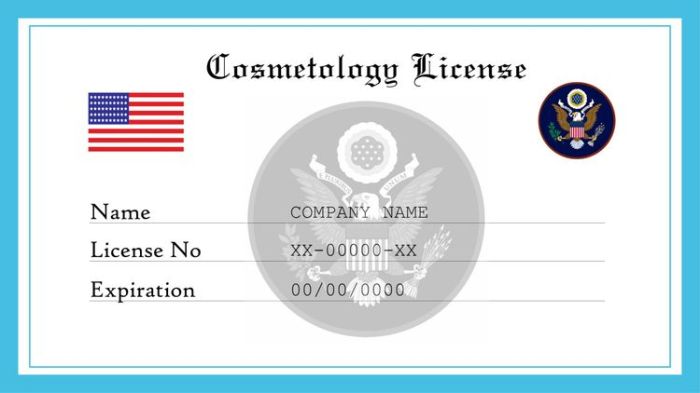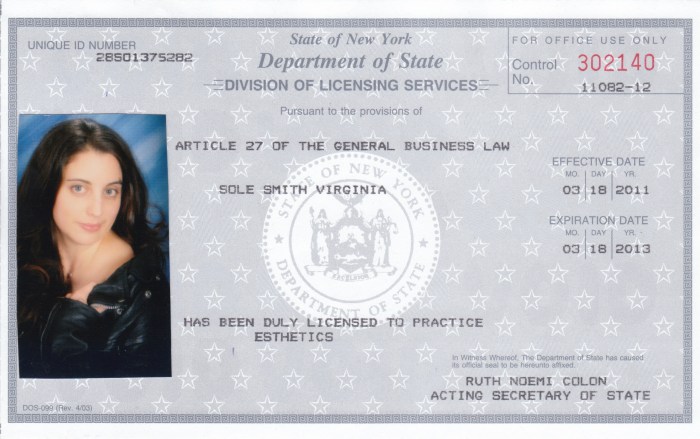State board of cosmetology new hampshire – The State Board of Cosmetology in New Hampshire plays a pivotal role in regulating and shaping the cosmetology industry within the state. With a commitment to protecting consumers and upholding professional standards, the board ensures that licensed cosmetologists possess the necessary skills, knowledge, and ethical practices to provide safe and high-quality services to the public.
The board’s responsibilities encompass licensing, education, industry regulations, and consumer protection. Through its dedicated efforts, the State Board of Cosmetology in New Hampshire fosters a thriving and responsible cosmetology industry that contributes to the well-being and appearance of the state’s residents.
State Board of Cosmetology in New Hampshire
The State Board of Cosmetology in New Hampshire is a regulatory body responsible for overseeing the cosmetology industry within the state. Its primary mission is to protect the public by ensuring that cosmetology services are provided in a safe and ethical manner.
Board Members and Qualifications
The board consists of five members appointed by the governor. Members must have a minimum of five years of experience in the cosmetology industry and possess a valid cosmetology license in New Hampshire.
Role and Responsibilities
The board’s responsibilities include:
- Licensing and regulating cosmetologists and cosmetology establishments
- Establishing and enforcing industry standards for sanitation, safety, and ethical practices
- Investigating complaints against cosmetologists or businesses
- Providing continuing education opportunities for cosmetologists
Licensing Requirements for Cosmetologists in New Hampshire

To become a licensed cosmetologist in New Hampshire, individuals must meet the following requirements:
Education and Training
Complete an accredited cosmetology program consisting of at least 1,500 hours of instruction in areas such as hair care, skin care, and nail care.
Examination
Pass the National Cosmetology Examination administered by the National-Interstate Council of State Boards of Cosmetology (NIC).
Application and Fees
Submit an application to the State Board of Cosmetology along with the required fees. The application fee is $75, and the examination fee is $100.
Renewal
Cosmetology licenses must be renewed every two years. To renew, cosmetologists must complete 12 hours of continuing education and pay a renewal fee of $50.
Cosmetology Schools and Programs in New Hampshire

The following table lists accredited cosmetology schools and programs in New Hampshire:
| School | Program | Curriculum | Tuition | Duration |
|---|---|---|---|---|
| Granite State College | Cosmetology | Hair care, skin care, nail care, makeup artistry | $15,000 | 12 months |
| Manchester Community College | Cosmetology | Hair care, skin care, nail care, salon management | $12,000 | 18 months |
| Nashua Community College | Cosmetology | Hair care, skin care, nail care, aesthetics | $13,000 | 15 months |
Financial aid and scholarship opportunities may be available for cosmetology students. Students should contact the individual schools for more information.
Career Opportunities for Cosmetologists in New Hampshire

Licensed cosmetologists in New Hampshire have various career opportunities available to them, including:
Salon and Spa Positions, State board of cosmetology new hampshire
- Hairstylist
- Skin care specialist
- Nail technician
- Makeup artist
Other Beauty-Related Businesses
- Cosmetology instructor
- Product representative
- Salon owner
Earning Potential and Job Outlook
The earning potential for cosmetologists in New Hampshire varies depending on experience, skill level, and location. According to the Bureau of Labor Statistics, the median annual salary for cosmetologists in New Hampshire is $30,000. The job outlook for cosmetologists is expected to grow by 10% in the next ten years.
Industry Regulations and Standards in New Hampshire: State Board Of Cosmetology New Hampshire
The State Board of Cosmetology in New Hampshire enforces industry regulations and standards to ensure the safety and well-being of both cosmetologists and consumers. These regulations include:
Sanitation and Safety
- Requirements for proper sterilization of equipment
- Guidelines for maintaining a clean and sanitary work environment
- Protocols for handling hazardous chemicals
Ethical Practices
- Prohibition of using false or misleading advertising
- Requirement for cosmetologists to disclose any potential conflicts of interest
- Guidelines for maintaining client confidentiality
Consequences of Non-Compliance
Non-compliance with industry regulations can result in disciplinary action by the State Board of Cosmetology, including fines, license suspension, or revocation.
Consumer Protection and Complaints

The State Board of Cosmetology in New Hampshire plays a vital role in protecting consumers from unlicensed or unethical cosmetology practices. Consumers can file complaints against cosmetologists or businesses by:
- Contacting the board by phone, email, or mail
- Filing a complaint online through the board’s website
The board will investigate all complaints and take appropriate action, which may include issuing a warning, suspending a license, or revoking a license.
User Queries
What are the educational requirements for cosmetology licensure in New Hampshire?
To obtain a cosmetology license in New Hampshire, individuals must complete an accredited cosmetology program of at least 1,500 hours.
How do I file a complaint against a cosmetologist or business?
Complaints can be filed with the State Board of Cosmetology in writing or by calling their office. The complaint should include details of the alleged violation and any supporting documentation.
What are the consequences of practicing cosmetology without a license in New Hampshire?
Unlicensed practice of cosmetology is a misdemeanor offense in New Hampshire and may result in fines or imprisonment.